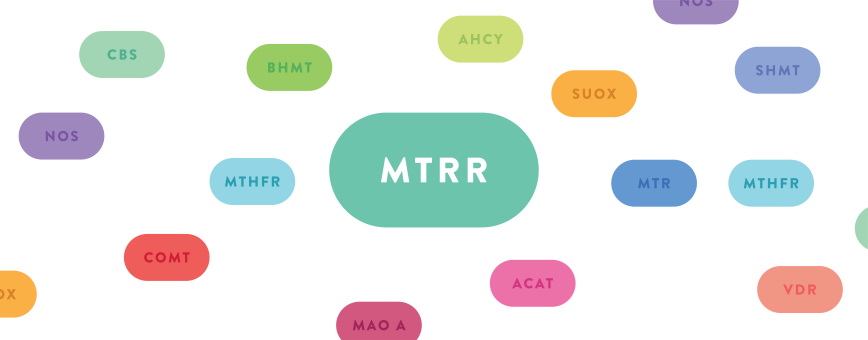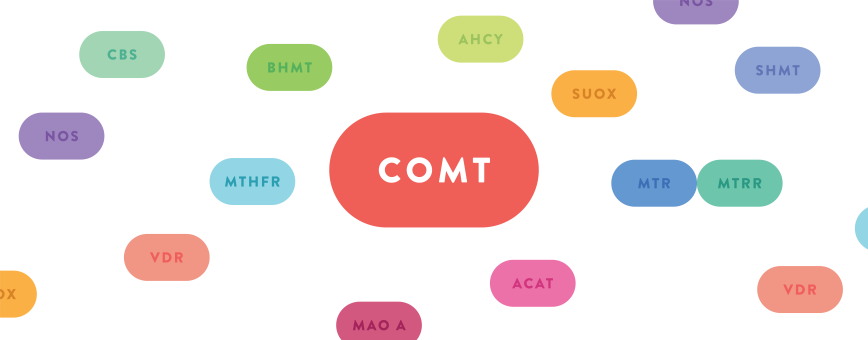The CBS gene gives your body instructions on how to make the enzyme cystathionine beta-synthase.1 This enzyme uses vitamin B6 to convert homocysteine and serine into cystathionine (the precursor of cysteine). This reaction allows methionine and homocysteine to be excreted from the methylation pathway.1
The CBS enzyme acts as a gate between homocysteine and the downstream portion of the methylation pathway, which is responsible for generating ammonia in the body. Deficiencies in this gene can cause cystathionine beta-synthase deficiency (CBSD), which can lead to homocystinuria.2
The CBS mutations that are identified in our DNA Nutrigenomic Test focus on increased CBS activity, and consequently increased activity of the CBS enzyme. 3-8 Increased activity of both the gene and enzyme can result in the depletion of other segments of the methylation cycle, including supplemented B12 that is administered to address other mutations.
CBS function is influenced by vitamin B6, individual betaine and folate levels, and may have cumulative effects with MTHFR SNPs. Harmful gut microbes, oxidative stress, and SAMe supplementation can also contribute to increased CBS activity. 9,10
There are three SNPs in CBS that Dr. Amy looks at in the DNA Nutrigenomic Test: A360A, C699T, and N212N.
I’m not sure if I have a CBS mutation, how can I find out?
Our DNA Nutrigenomic Test identifies a custom panel of 30 single nucleotide polymorphisms (SNPs), designed by Dr. Amy. This panel tests for 3 different CBS variations; A360A, C699T, and N212N.
While there are thousands of genes and SNPs that can be examined, Dr. Amy has designed The DNA Nutrigenomic Test panel to focus on 30 SNPs that are part of the methylation cycle. This is a key nutritional pathway in the body that is central to health.
Many of the SNPs in Dr. Amy’s custom panel are in the control or regulatory portion of the gene, meaning these SNPs can have a significant impact on your health. These include some of the more unique SNPs on this panel and are not always covered by other DNA profile tests.
The analysis includes supplement suggestions based on personalized results and provides a comprehensive assessment of the methylation cycle. Proper function of the methylation cycle is essential for several key pathways in the body. When genetic mutations, or “weaknesses”, are present in this cycle, there may be increased risk factors for a range of health concerns. To learn more about the DNA Nutrigenomic Test and The Yasko Protocol, read our Getting Started Packet here.
How can I support my CBS mutation?
Nutrigenomic pathways are different between individuals and proper supplementation can help support specific imbalances. Holistic Health International offers a variety of supplements to support different CBS mutations within the SNP Support Category here.
Kidney-Kare was originally named after those with CBS SNPs in their genetics, these capsules offer ingredients to help individuals struggling with weak kidneys and/or high ammonia levels in urine.
You do not need to use every supplement listed in each category! Supplements are provided as options to discuss with your own health care professional, to gradually add in as you feel they are needed, and for additional consideration based on biochemical test results.
The beauty of looking at targeted SNPs in the methylation cycle is that it’s a nutritional pathway, meaning if you find a mutation or imbalance in your system, you have ways to support or bypass them.
The information expressed on this webpage does not constitute an attempt to practice medicine nor does it establish a doctor-patient relationship. Content on the site is for informational and educational purposes only. The information expressed is not meant to replace you working with a physician or health care practitioner.
Information and statements have not been evaluated by the U.S. Food & Drug Administration (FDA) and are not intended to diagnose, treat, cure or prevent any disease or be used as the basis for treating a particular symptom or disease. Any products discussed or endorsed are not intended to diagnose, treat, cure or prevent any diseases or be used as the basis for treating a particular symptom or disease. If you have specific healthcare concerns or questions about the products displayed, contact your licensed healthcare professional for advice or answers.
References:
1. P35520 · CBS_HUMAN. Accessed 2023, April 25. https://www.uniprot.org/uniprotkb/P35520/entry
2. CBS cystathionine beta-synthase [ Homo sapiens (human) ]. 2023, April 9. Accessed 2023, April 25. https://www.ncbi.nlm.nih.gov/gene/875
3. Fredriksen A, Meyer K, Ueland PM, Vollset SE, Grotmol T, Schneede J. Large-scale population-based metabolic phenotyping of thirteen genetic polymorphisms related to one-carbon metabolism. Hum Mutat. Sep 2007;28(9):856-65. doi:10.1002/humu.20522
4. Aras O, Hanson NQ, Yang F, Tsai MY. Influence of 699C-->T and 1080C-->T polymorphisms of the cystathionine beta-synthase gene on plasma homocysteine levels. Clin Genet. Dec 2000;58(6):455-9. doi:10.1034/j.1399-0004.2000.580605.x
5. Kruger WD, Evans AA, Wang L, et al. Polymorphisms in the CBS gene associated with decreased risk of coronary artery disease and increased responsiveness to total homocysteine lowering by folic acid. Mol Genet Metab. May 2000;70(1):53-60. doi:10.1006/mgme.2000.2993
6. De Stefano V, Dekou V, Nicaud V, et al. Linkage disequilibrium at the cystathionine beta synthase (CBS) locus and the association between genetic variation at the CBS locus and plasma levels of homocysteine. The Ears II Group. European Atherosclerosis Research Study. Ann Hum Genet. Nov 1998;62(Pt 6):481-90. doi:10.1046/j.1469-1809.1998.6260481.x
7. Shan X, Dunbrack RL, Jr., Christopher SA, Kruger WD. Mutations in the regulatory domain of cystathionine beta synthase can functionally suppress patient-derived mutations in cis. Hum Mol Genet. Mar 15 2001;10(6):635-43. doi:10.1093/hmg/10.6.635
8. De Lucca M, Casique L. Characterization of cystathionine beta-synthase gene mutations in homocystinuric Venezuelan patients: identification of one novel mutation in exon 6. Mol Genet Metab. Mar 2004;81(3):209-15. doi:10.1016/j.ymgme.2003.12.003
9. Janosík M, Kery V, Gaustadnes M, Maclean KN, Kraus JP. Regulation of human cystathionine beta-synthase by S-adenosyl-L-methionine: evidence for two catalytically active conformations involving an autoinhibitory domain in the C-terminal region. Biochemistry. Sep 4 2001;40(35):10625-33. doi:10.1021/bi010711p
10. Niu WN, Yadav PK, Adamec J, Banerjee R. S-glutathionylation enhances human cystathionine β-synthase activity under oxidative stress conditions. Antioxid Redox Signal. Feb 10 2015;22(5):350-61. doi:10.1089/ars.2014.5891









